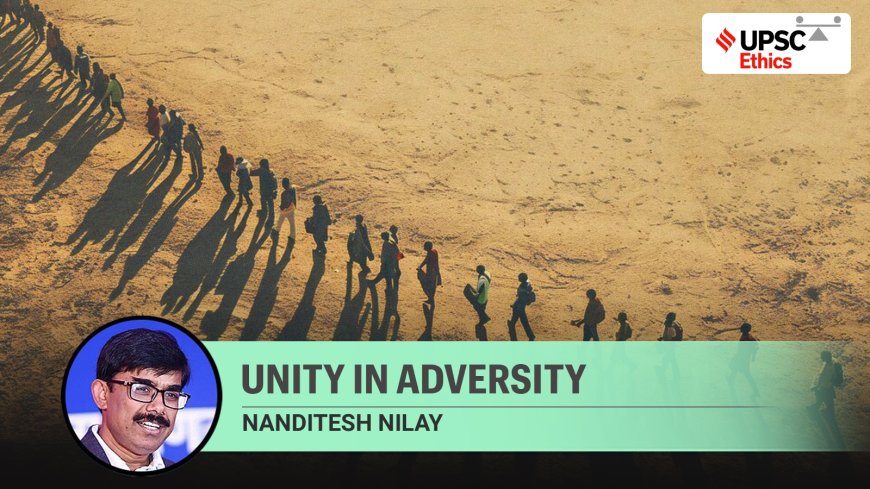UPSC Ethics Simplified | What does unity truly mean in a world shaken by terrorism?

Asarkari - Sarkari News, Jobs & Updates
UPSC Ethics Simplified | What does unity truly mean in a world shaken by terrorism?
By Priya Sharma
kam sabdo me kahein to, this article explores the ethical complexities of defining and maintaining unity in societies facing the persistent threat of terrorism, a crucial topic for UPSC aspirants studying ethics.
Introduction: The Fractured Mirror of Unity
In an ideal world, unity signifies harmony, cohesion, and a shared sense of purpose within a society. It's the glue that binds diverse populations together, fostering peace and progress. However, the pervasive shadow of terrorism casts a long, dark reflection on this ideal. Acts of terror are designed not just to inflict physical harm but to shatter the very foundations of societal trust, sow discord, and fracture the bonds that unite us. For aspirants preparing for the UPSC examination, particularly the Ethics, Integrity, and Aptitude paper (GS Paper 4), understanding the nuanced meaning of unity in this challenging context is paramount. What does it truly mean to be united when forces actively seek to divide?
Beyond Superficial Bonds: Redefining Unity
Traditionally, unity might be perceived through commonalities – shared language, culture, religion, or ethnicity. While these factors contribute to social identity, relying solely on them makes unity fragile. Terrorism often exploits these very identities, pitting groups against each other, fueling suspicion, and creating 'us vs. them' narratives. An attack targeting a specific community can provoke fear and resentment, tempting society to retreat into segregated camps. This is precisely the terrorist's goal: to erode the social fabric from within.
Therefore, a deeper, more resilient understanding of unity is required. Ethical unity, in the face of terrorism, transcends superficial similarities. It is founded on shared values – the unwavering commitment to justice, equality, human dignity, compassion, and the rule of law. It means standing together not just because we are alike, but because we believe in the same fundamental principles that protect everyone, regardless of their background.
The Ethical Response to Terrorism's Challenge
Terrorism presents profound ethical dilemmas. How does a society respond to violence without compromising its own values? How can security measures be implemented without infringing upon civil liberties or targeting specific communities unjustly? True unity, in this context, involves:
1. Resilience Rooted in Values: United societies resist the urge to scapegoat or generalize. They reaffirm their commitment to democratic principles and human rights, even when under duress. The strength lies not in homogeneity, but in the shared resolve to uphold ethical standards.
2. Empathy and Solidarity: When one part of the community is attacked or feels vulnerable, ethical unity demands that others stand in solidarity. It requires active empathy – understanding the fear and pain experienced by victims and targeted groups, and offering support.
3. Rejecting Divisive Narratives: Unity involves actively challenging the narratives of hate and division spread by terrorists and extremist ideologies. This requires critical thinking, media literacy, and promoting dialogue over demonization.
4. Inclusive Governance and Justice: Governments play a crucial role by ensuring that counter-terrorism measures are just, proportionate, and do not alienate segments of the population. Addressing root causes like inequality, discrimination, and lack of opportunity is vital for long-term unity and security. An inclusive approach strengthens the collective resolve against extremism.
Building Bridges, Not Walls
Fostering this ethical unity is not merely a top-down process; it requires active participation from civil society and individuals. Educational institutions can promote intercultural understanding and critical thinking. Community leaders can facilitate dialogue and build bridges between different groups. Individuals have a responsibility to challenge prejudice in their daily lives, promote tolerance, and engage constructively with those who hold different views. It's about consciously choosing connection over division, understanding over suspicion.
This approach acknowledges our diversity not as a weakness to be exploited by terrorists, but as a strength to be celebrated within a framework of shared ethical commitments. It requires courage – the courage to trust, to empathize, and to uphold our values even when faced with violence and fear. For more insights and updates on governance and societal issues, you might want to check resources regularly. For more updates, visit https://asarkari.com.
Conclusion: Unity as an Ethical Imperative
In a world grappling with the threat of terrorism, unity cannot be a passive concept based merely on shared identity. It must be an active, ethical commitment – a conscious choice to uphold principles of justice, empathy, and human dignity for all. It involves resisting fear and division, fostering solidarity across diverse groups, and building resilience grounded in shared values. For UPSC aspirants, understanding this complex interplay between ethics, unity, and security is crucial for envisioning and contributing to a just and peaceful society. True unity doesn't just withstand the shock of terrorism; it emerges stronger, guided by an unwavering ethical compass.
- Team Asarkari
Keywords
UPSC ethics, unity definition, terrorism impact, ethical governance, social cohesion, national integration, combating terrorism, GS Paper 4 topics, societal values, counter terrorism ethics, diversity and unity, building resilienceWhat's Your Reaction?
 Like
0
Like
0
 Dislike
0
Dislike
0
 Love
0
Love
0
 Funny
0
Funny
0
 Angry
0
Angry
0
 Sad
0
Sad
0
 Wow
0
Wow
0









































